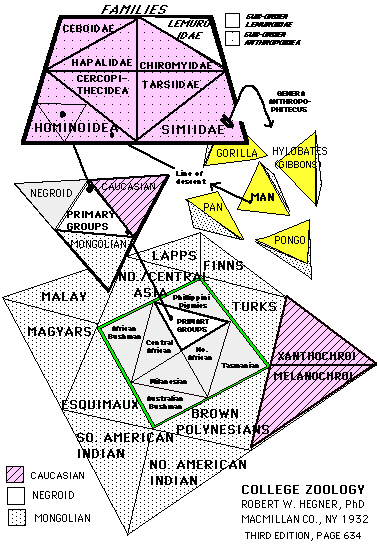[FONT="]
Barbarian observes:
Of course. Typology was scientifically unsupportable, as well as morally indefensible, when typologists like Agassiz (and people who were much, much worse) applied it to humans.
What utter nonsense.
Linnaeus's classification system is entirely based on the concept that living things are types derived from their archetypes - and which could not transgress those boundaries.
Therefore, he could correctly classify them right down to fixed species - which are a subdivision of the archetype.
His system has persisted down to this day - everything has a specific and generic name.
Why is that, do you suppose? Why do species exist, if they are in a state of evoultionary flux? Why don't we see any flux today, in the numbers required to generate a few million species?
Simple. Evolution is nonsense, and I believe that you know it, but can't abandon your entrenched position.
Why can you not deny the typological method, but are forced to confine your remarks to the human types?
Explain to us how any one of the great groups of chordates can be transformed into any other group - without compromising your conscience, I mean.
Explain to us why there ARE species - classified as such by highly competent and well-trained taxonomists.
A review of all that you have said so far shows that either
a.you do not or cannot comprehend the OPs
I'm a biologist. And a student of the history of science. I understand Agassiz and typology and why it led to the most virulent of racism. Agassiz didn't hate black people, although they gave him the willies when they were near him. He just took his theory of typology to the logical conclusion. If superficial characteristics mark different creations of unrelated creatures, then blacks are a different species.
You're back to the irrelevancies again. You have nothing to say about the main argument I have raised. Why not just admit it?
Your point about Agassiz and the black race does in no way affect the scientific basis for his typology. It is, effectively, an
ad hom directed at Agassiz, which has nothing to do with the facts.
b. are deliberately obfuscating the issues and confining your remarks to human types, with a few ad hominems thrown in for good measure since you cannot gainsay the simple fact that types do exist.
You've confused the fact that types exist, with the notion that they cannot have a common ancestor. This is the error the typologists made with all living things, including humans.
There is no confusion in my mind. There is NO SUCH THING as a common ancestor of anything. If so, name it and its descendants. Show us a picture, or a drawing of it. Best of all, find us a fossil of it, and then perhaps you will be worth listening to.
Till then, why not just admit that it doesn't exist - after 200 or more years of digging up the fossils? It will be less disgraceful.
Now how about demonstrating that all the chordates listed by CD are not types which cannot be confused with any other types?
Could you rephrase that in English? Again, you're confusing types with separately created things. As you learned earlier, different types can be shown to be related to each other (for example) by genetics. And we know that works, because we can do it with organisms of known descent.
Typo.
Re-write: Now how about demonstrating that all the chordates listed by CD are not types which
can be confused with any other types?
If you're denying transitional forms again, this would be a good time for you to pick up the challenge you dodged earlier, and show me two major groups, said to be evolutionarily connected, which lack a transitional.
I stopped replying to you earlier on, because I proved on 2 occasions that you were lying. It is only out of the goodness of my heart that I have resumed a conversation. So don't bring that up again.
Choose any 2 groups of the chordates, and produce a transitional. Like reptiles and amphibia will do for a start.
Here's Denton on the point. Pay close attention to the diagram:[/FONT]










 2(Me, trying to pat myself on the back to no avail.)
2(Me, trying to pat myself on the back to no avail.)